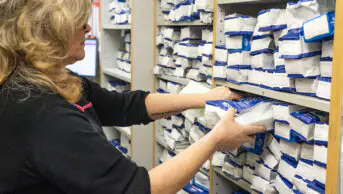
Shutterstock.com
Pharmacists should use social media “responsibly”, applying the same standards as they would to a face-to-face interaction, the Royal Pharmaceutical Society (RPS) has advised in updated good practice guidance.
The advice in the 44th edition of Medicines, Ethics and Practice (MEP 44) forms part of a new section on managing the interface between personal and professional life.
The guidance says that managing this crossover is one of the most common examples of potential conflicts of interest or ethical dilemmas, and is also one that pharmacists are most likely to encounter early in their careers.
It advises that pharmacists who use social media, which it says includes blogging, web forums, Twitter, Facebook and WhatsApp, “should do so responsibly and with the same high standards which they would apply in face to face interactions”.
It highlights the importance of respecting “the confidentiality of others, including patients and colleagues”.
“Be aware of the potential audience of your online activity, that this may be publicly accessible, circulated and shared beyond your control,” it says. “This activity could impact upon your professional image and the reputation of the profession as a whole.”
The guidance also looks at how to manage friends and family asking for advice, pointing out that if a pharmacist provides pharmacy services, such as advice, outside of their work environment, they “are still expected to provide it to the same standard” as if they were at work, adding that a pharmacist’s “liability if anything should go wrong is likely to be the same”.
Rakhee Amin, senior professional standards pharmacist at the RPS, said that this new section “came about from a discussion with the [MEP] advisory panel, who wanted to emphasise that you should behave professionally even if you have only just started studying pharmacy”.
“For example, as soon as they start university, students often find family and friends asking for advice, which can put them in awkward situations.”
Another new section, ‘Being culturally informed’, offers advice to help pharmacists “in interacting with people who are in different cultural groups to yourself”.
It includes advice on checking how a person prefers to be addressed, the importance of avoiding “unwarranted assumptions” and guidance on how to create an environment that feels welcoming to people from multiple cultures.
Among examples of the latter, the guidance suggests displaying “information intended for patients from multiple cultures (e.g. medication and fasting in Ramadan, LGBTQ health)”, as well as policies and statements on equality and diversity.
Amin said the new section is in response to a desire from pharmacists and pharmacy students for “more information to help them be aware on the implications of culture to be able to provide good care to all patients”.
Sonia Garner, professional standards adviser at the RPS and editor of MEP 44, said the MEP “remains extremely popular and supports pharmacy students’ learning, as well as enabling pharmacists to practise confidently and professionally”.
“We thank everyone who has helped to compile this edition of the MEP, and those who have provided expert advice and information during its preparation.”
The MEP was not updated in 2020 because the Society’s resources were focused on the COVID-19 pandemic.
A print copy of MEP 44 has been posted out to RPS members who are pharmacists, including foundation trainee pharmacists, and all members can access the online version, which will be available from 26 July 2021. It is also available for purchase from Pharmaceutical Press.
READ MORE: What to do when social media goes bad


